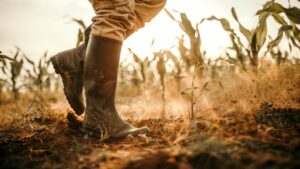COPA & COGECA Secretary-General Pekka Pesonen talks about quality seeds, new breeding techniques and research & innovation.
By 2050 we know that the global demand for food is set to increase by 70 per cent if we are to meet the needs of a world population of around nine billion. We also know that farmers are experiencing several pressures related to the natural environment such as scarcity of available land, water shortages and weather extremes due to climate change impacts and new and emerging pests and diseases. All this makes it increasingly difficult for them to produce safe and nutritious food in a sustainable manner.
With that in mind, we felt it time for European Seed to check in with the two foremost organizations in Europe representing farmers and cooperatives: COPA (Committee of Professional Agricultural Organisations) and COGECA (General Confederation of Agricultural Cooperatives). We sat down with COPA and COGECA Secretary-General Pekka Pesonen.
Up against increasing challenges, it is crucial for farmers to have quality seeds and new breeding techniques (NBTs) to enable them to produce more in a sustainable way and using less resources, Pesonen said.
Speaking in Brussels, Pesonen said, “European farmers are up against increasing challenges, hit by low market prices and high input costs, extreme weather events and price volatility. Their incomes are half the average level and it is becoming more and more difficult to attract young people to enter the industry. At the same time, the world population is expected to grow by 60 per cent by 2050 and it will become more important than ever to produce more using limited resources.
“The best way to achieve these combined objectives is through ‘green growth’, with solutions which contribute to a productive agricultural sector and have a positive impact on the environment. ‘Green growth’ requires a more efficient agriculture, which helps farmers better use limited resources whilst increasing supply”, Pesonen added.
“In order to foster ‘green growth’, farmers need high-quality seeds and propagating materials which are well-adapted to a large range of agri-climatic conditions and uses. High-quality, reliable and performant genetic material is extremely important for all types of agriculture, including conventional and organic, especially in Europe. Knowing that the varieties have been tested and evaluated according to established criteria is a form of assurance for farmers. Yield must still be included in the list of VCU (Value for Cultivation and Use: performance tests) criteria, which is of the utmost importance for farmers, to give them the possibility of choosing the best varieties,” Pesonen said.
“In order to foster ‘green growth’, we also need a policy framework for agriculture which gives priority to research and innovation. We have successfully improved productivity by employing new cultivation methods, new plant varieties or even new species as well as new organisation techniques. But we also have to ensure that knowledge is transferred to farmers and they uptake innovations. The future Common Agricultural Policy (CAP) and Horizon 2020 should promote productivity in a sustainable manner, for instance via the investment measures available in the EU rural development programmes and the European Innovation Partnership.”
Pesonen said together with the European Seed Association (ESA), COPA & COGECA are involved jointly in the European technologic platform to lobby research policy and still get public support for plant genomic improvement. He is proud of the results achieved on the 2020 Horizon Program for research.
“Now it’s time that the main players of the research come back to this platform if we want to stay credible in the eyes of the Commission.”
Plant Breeding Innovation
New Breeding Techniques (NBTs) are also very important tools to support innovation in the plant breeding sector. Indeed, they have a fundamental role to play. NBTs evolve rapidly.
“They offer many new possibilities in plant breeding. For instance, they make it possible to precisely edit plants, thus allowing the development of new functions to optimise existing features or identify and develop new traits. By permitting a greater use of genetic variability and a better use of existing genetics, NBTs can provide solutions to the numerous challenges that European agriculture is facing. NBTs contribute to developing varieties that use fewer inputs, improving the quantity and consistency of yields, adapting to climate change, producing sufficient and high-quality food, and diversifying crops for production in order to optimise crop rotations. NBTs go hand-in-hand with other technological developments, such as precision farming, digital farming, and it is crucial to do more here”, Pesonen stressed.
Patenting Products of Essentially Biological Processes
“We also support the EU Commission recommendations to not allow patents on products which have been created via essentially biological processes. The Commission’s notice in November underlined that plants that are obtained by means of ‘essentially biological’ breeding techniques are not patentable. This recommendation goes against the practices of the European Patent Office (EPO) which has already authorized many patents using essentially biological processes like tomatoes and broccoli. The Commissions’ recommendation is a step in the right direction”, he said.
Pesonen explained that COPA & COGECA have constantly stressed that patent law is an inappropriate instrument for the EU agriculture sector. All genetic resources must remain readily available for farmers and breeders so that they can make progress in the breeding sector.
“But the Commission’s recommendation is not clear on excluding natural traits obtained by non-essentially biological processes from patentability. These New Breeding Techniques are yet to be defined and classified by the Commission. Moreover, the Commission’s recommendation is not legally binding and the EPO is an independent body. We therefore call on national governments to ensure that the EPO respects the Commission’s recommendation in order to ensure that existing plants do not fall under the scope of patent law.”
Pesonen urged the European Commission to ensure that research, development and innovation projects on NBTs are not outsourced outside of the EU, and public research institutes can continue to enjoy access to these new techniques. The EU’s Horizon 2020 program needs to be used to support research, innovation and the development of NBTs in agriculture.
“A top priority for us in the coming months is also to prepare for the Common Agricultural Policy post-2020, so that we will be in a strong position to take part on EU Commission public consultation on this in 2017”, he added.
“After suffering a severe agriculture crisis for over two years in Europe, hit by low prices and high input costs, we want a much stronger CAP in the future which has truly common policies to ensure a level playing field with less red tape that stifles innovation. The CAP post-2020 must better respond to consumer demands and to crises. It must be stable and based on economics so that farmers and agri-cooperatives can plan ahead and remain viable. More focus needs to be put on innovation, research and development. Infrastructures also need to be improved in many EU rural areas with access to broadband, education and training so that farmers can benefit from the new technologies”, he added.
Wrapping up, he explained that the joint COPA & COGECA Secretariat was first created in 1962 in Brussels and represents the united voice of farmers and agri-cooperatives in the EU. COPA represents nearly 23 million farmers and their families whilst COGECA represents the interests of 22,000 agricultural cooperatives. “Together, we want to ensure that the EU agriculture sector is sustainable, innovative and competitive, guaranteeing food security to half a billion people throughout Europe,” Pesonen said.
Based in Brussels, representing 66 member organisations from the EU member states, Pesonen said their aim is to influence key EU policymakers in Brussels about the benefits of the EU agriculture sector for quality food supplies, the environment, growth and jobs. “We have 45 working parties that meet regularly to develop our joint position papers on upcoming issues and which are approved by presidents from across Europe so that we can be in a position to inform decision-makers of our views. We also aim to better communicate with the public about the good work farmers and cooperatives do and of the many benefits a sustainable EU agriculture sector has to offer.”











